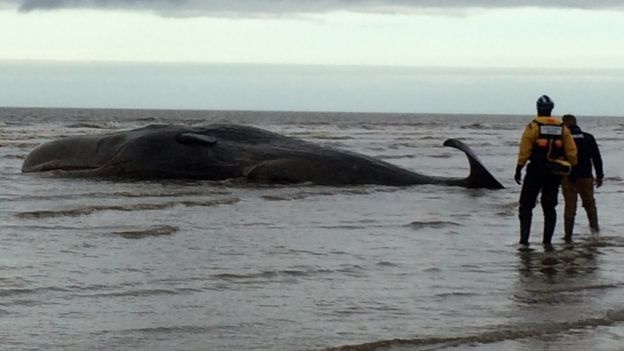Nick 0208 Ldn
News 24
- Joined
- Mar 10, 2004
- Messages
- 23,721
Sperm whale stranded on Hunstanton beach in Norfolk

Efforts are under way to rescue a sperm whale that became stranded on a beach in Norfolk, as the tide comes back in.
The UK Coastguard received a call just after 07:30 GMT to say the 14m (46ft)-long bull had been washed up.
It was spotted about two miles east of where another sperm whale became stranded and died on 22 January.
The mammal is partly submerged in the sea and has been moving, but an expert said it was "unlikely to survive".
Stephen Marsh, operations manager for British Divers Marine Life Rescue, said: "The tide may well lift it but we don't think it would survive another stranding if it came back in.
"There's nothing we can do - it's likely to be between 25 and 30 tonnes.
"We can't lift it, we can't roll it, the vets can't put it out of its misery.
"The body will be breaking down and releasing toxins, causing organ failure."
The whale became beached about 1.5 miles out on the sand.
Jeremy Littlewood from UK Coastguard said it was the sixth beached whale the agency had dealt with in the area recently.
"It is obviously a very distressing scene and we would advise members of the public, for their own safety, to keep at a safe distance," he said.
Expert analysis: Ben Garrod, broadcaster and Anglia Ruskin University lecturer
It is always tragic to see something like this, but it does seem like it is a naturally occurring event.
It is a massive pod and they have washed up in Germany, the Netherlands and the UK.
The ones that have been dissected from mainland Europe have had very, very empty stomachs.
They are exhausted anyway and they come into these very shallow waters in the Wash and by the time they start to beach themselves they are in a cardio-vascular collapse.
By the time they start to wash up, they are in big trouble anyway.
This represents the largest sperm whale stranding episode in England in the last hundred years.
It is not yet known whether this whale is from the same bachelor pod as five others that became stranded and died on beaches in Skegness, Lincolnshire, and Hunstanton last month.
The Receiver of Wreck and the Zoological Society of London have been informed of the stranding.
http://www.bbc.co.uk/news/uk-england-norfolk-35491621
That area is home to some of the UK's offshore wind farms, which could have made an already bad situation worse still.

Efforts are under way to rescue a sperm whale that became stranded on a beach in Norfolk, as the tide comes back in.
The UK Coastguard received a call just after 07:30 GMT to say the 14m (46ft)-long bull had been washed up.
It was spotted about two miles east of where another sperm whale became stranded and died on 22 January.
The mammal is partly submerged in the sea and has been moving, but an expert said it was "unlikely to survive".
Stephen Marsh, operations manager for British Divers Marine Life Rescue, said: "The tide may well lift it but we don't think it would survive another stranding if it came back in.
"There's nothing we can do - it's likely to be between 25 and 30 tonnes.
"We can't lift it, we can't roll it, the vets can't put it out of its misery.
"The body will be breaking down and releasing toxins, causing organ failure."
The whale became beached about 1.5 miles out on the sand.
Jeremy Littlewood from UK Coastguard said it was the sixth beached whale the agency had dealt with in the area recently.
"It is obviously a very distressing scene and we would advise members of the public, for their own safety, to keep at a safe distance," he said.
Expert analysis: Ben Garrod, broadcaster and Anglia Ruskin University lecturer
It is always tragic to see something like this, but it does seem like it is a naturally occurring event.
It is a massive pod and they have washed up in Germany, the Netherlands and the UK.
The ones that have been dissected from mainland Europe have had very, very empty stomachs.
They are exhausted anyway and they come into these very shallow waters in the Wash and by the time they start to beach themselves they are in a cardio-vascular collapse.
By the time they start to wash up, they are in big trouble anyway.
This represents the largest sperm whale stranding episode in England in the last hundred years.
It is not yet known whether this whale is from the same bachelor pod as five others that became stranded and died on beaches in Skegness, Lincolnshire, and Hunstanton last month.
The Receiver of Wreck and the Zoological Society of London have been informed of the stranding.
http://www.bbc.co.uk/news/uk-england-norfolk-35491621
That area is home to some of the UK's offshore wind farms, which could have made an already bad situation worse still.
Last edited:
